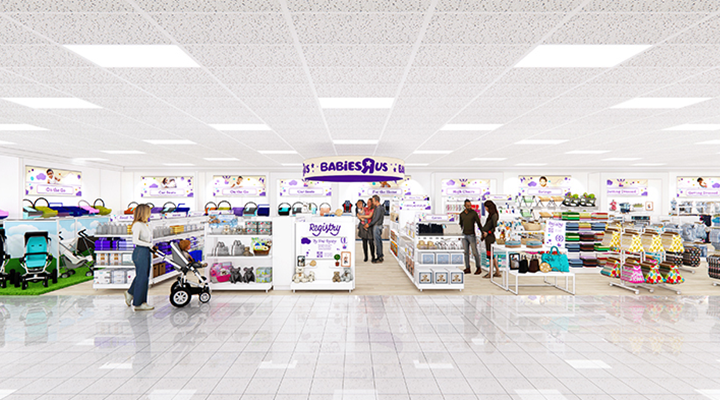More than five years after the specialty baby goods retailer closed its physical retail stores, Babies ‘R’ Us is making a comeback with the launch of shop-in-shops in 200 Kohl’s stores starting in August. The launch follows Kohl’s announcement of an exclusive partnership with WHP Global, which acquired Babies ‘R’ Us and parent-brand Toys ‘R’ Us in 2021. Kohl’s expansion within the family and baby category The Babies ‘R’ Us
#8217; Us shop-in-shops are an extension of Kohl’s existing product offering for kids and babies, which includes brands like Little Co. by Lauren Conrad, Jumping Beans, Carters, Nike, and more. Babies ‘R’ Us also has an online offering via Kohl’s.
The partnership reflects Kohl’s strategy of prioritizing baby and family-centered merchandise, the company’s CEO Tom Kingsbury said.
“Evolving our assortment and bringing more relevant product to the millions of customers we serve is a core focus as we continue to deliver on Kohl’s broader growth strategy,” Kingsbury said in a statement.
“We see significant opportunity in the baby gear category, and partnering with Babies ‘R’ Us is another example of how we are finding new ways to optimize our assortment and further establish Kohl’s as the go-to brand for families.”
According to market research firm Market.us, the baby goods market was estimated to be worth $90.8 billion in 2022 and is projected to surpass $172 billion by 2032, growing at a compound annual growth rate of 6.8 per cent from 2023 to 2032.
With the baby goods market expected to grow in the coming years, some retail experts see Kohl’s partnership with Babies ‘R’ Us as an advantageous move.
“Adding Babies ‘R’ Us is more of a help than a hindrance to Kohl’s,” GlobalData’s managing director and retail analyst Neil Saunders told Inside Retail. “It bolsters the proposition in an important area of the market and gives Kohl’s more credibility in the space. This should help drive some incremental revenue into the business.”
It’s also a smart strategy to future-proof the business.
“There is also a view that if Kohl’s can pull in younger family and family formation shoppers for baby products it can, hopefully, convert them into buying other categories like toys or homewares,” Saunders added.
Is Kohl’s partnerships effectively moving the brand forward?
Kohl’s partnership with the baby-centered retailer is one of several recent efforts from the department store to bolster its brand appeal and revenue.
In May, Kohl’s announced a partnership with Instacart, a San Francisco-based online delivery company, to provide faster delivery services.
In 2021, it teamed up with Sephora to launch small-format Sephora stores in all of its more than 1100 physical stores.
In a quarterly report released this March, Kohl’s shared that the Sephora at Kohl’s sales exceeded $1.4 billion in 2023. Additionally, the company stated that based on its current sales trajectory, it expects to surpass its previously shared goal of $2 billion in sales by 2025.
While these numbers look quite positive, it’s a relatively small drop in the revenue bucket for Kohl’s.
Kohl’s net sales in FY23 declined 3.4 per cent year-over-year to $16.6 billion, including the 53rd week. Comparable sales, which compare the 52 weeks ending January 27 this year to the 52 weeks ending January 28 last year, fell by 4.7 per cent.
As Saunders previously explained to Inside Retail, Kohl’s partnerships with Sephora, Instacart, and now Babies ‘R’ Us may provide a small financial or visitability boost for the retailer, they don’t the retailer’s core issues of a lack of investment in stores, mundane ranges, and weak pricing compared to retailers like Target.
“Kohl’s is working on these things, but it needs to fix them if it wants to compete and win market share,” Saunders said.
“For this to work properly, Kohl’s really needs to improve the look and feel of its stores and make its assortments and pricing more compelling. If it fails to tackle these things, this will be a reasonable venture but one that cannot throw a halo over the rest of the business – much as has been the case with Sephora.
“The bottom line is that Kohl’s can add in as many third-party brands and ventures as it wants, but there is a tactic admission here that its own core proposition isn’t good enough. It needs to work to dispel this view.”
Further reading: Will Kohl’s Instacart deal help it compete with Amazon?

